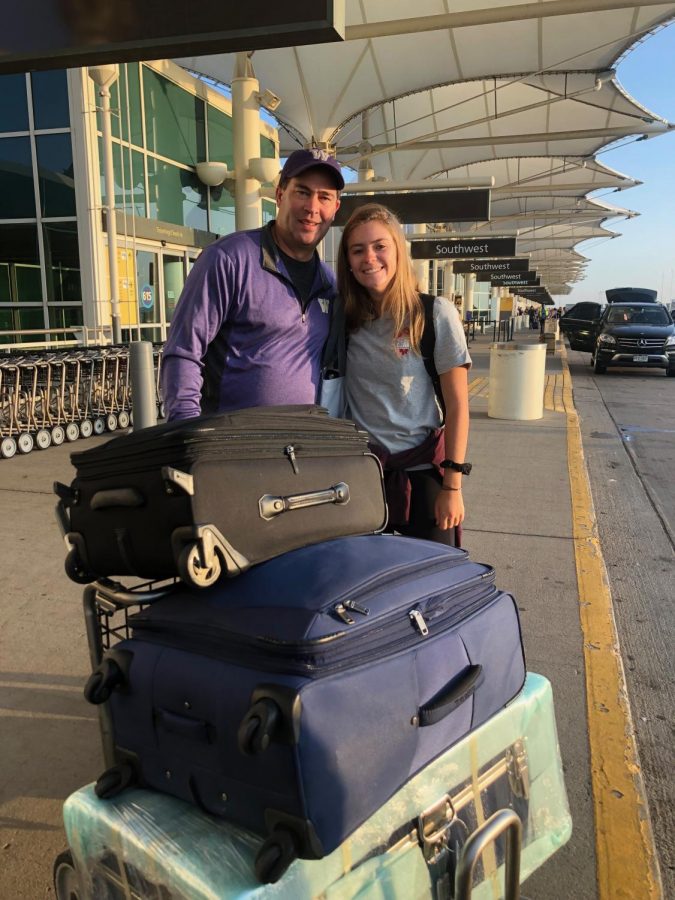How coronavirus has affected my family
University of Washington student, Abby Miranda with her father Rick Miranda.
March 11, 2020
My sister, Abby Miranda, a student at the University of Washington in Seattle:
Q: What is it like living in the city with the most severe cases of coronavirus?
A: A lot of people are wearing masks everywhere. They changed all of the campus food so that everything is individually packaged. You have to specifically ask for forks and knives and other stuff so they don’t get contaminated. It is really empty everywhere.
Q: How has coronavirus disrupted your life?
A: We have switched to online school so I don’t have a schedule anymore. I have to do all of my assignments online. All of my finals are online now and I have to write an additional research paper for biology about the coronavirus which isn’t fantastic. Everything being online is kind of disruptive to the whole academic process.
Q: Do you think that your school has reacted appropriately to coronavirus?
A: Yes, they have shut down everything and tried to make it spread less. However, I do think that online finals are very unfair, especially in my biology class, which sucks.
Q: Do you think the city of Seattle has done a good job in preventing the spread of coronavirus?
A: I am not really up to date about what’s been going on around the city or downtown area and what has been closed down because I am kind of isolated on campus. But, public transportation is still running, which I think is appropriate right now because otherwise people can’t really get around.
Q: Do you think that peoples’ fear of coronavirus is irrational or are they justified in being so worried?
A: I think that they’re justified in being worried just because it’s this whole new thing that can live on surfaces for a very long time and it is so easy to spread. I also think that it might be a little unjustified just because anyone that’s young that gets it has a really low chance of serious complications. I am not super educated on all the details of coronavirus, but I do think that on some level, the panic is a little bit unnecessary.
Q: What are your personal concerns that you have about coronavirus?
A: I’m worried about how it will affect my spring quarter for school and my summer job just because everything has already been shut down. We don’t even know how soon we will be able to return to campus after spring break which is horrifying. I am not as concerned about contracting the virus. I am a lot more concerned about the reaction and how it will affect my day-to-day life.
My dad, Rick Miranda, Associate Program Director of Internal Medicine at St. Joseph Hospital:
Q: Has coronavirus disrupted your life?
A: It has been disruptive in many regards. From a patient standpoint, we are getting a lot of inquiries about this matter. It has also really disrupted the workflow within the hospital with increased preparations to try and meet the demand that may be forthcoming. One of the other things specifically within our hospital that may not be affecting other hospitals, is that we are in a mask shortage. That is affecting the way we are having to treat patients as well as having certain personnel only being able to care for some patients. We work a lot with medical students and medical students are no longer allowed to work with patients with any sort of respiratory illness because of the lack of having personal protective equipment including masks.
Q: What precautions has your hospital taken in anticipation of having patients with coronavirus?
A: We’re trying to conserve personal protective equipment; as I just mentioned, there is a mass shortage. We are really trying to minimize the number of people going in and out of those rooms. Specifically within the hospital, they’ve just created a particular section in the emergency room that is literally cordoned off by big plastic walls. Only patients with what’s presumed coronavirus will be allowed into that specific area and very specific providers will be allowed in. There’s another area within the hospital itself that is also cordoned off as being dedicated towards the management of presumed corona patients.
Q: What recommendations do you have to people that are worried about catching coronavirus?
A: First and foremost, certainly take care of yourself; take every precaution that you can. Make sure that you’re washing your hands on a regular basis. Try to avoid direct contact with others. There’s been a lot of talk about how often we actually touch our face throughout the day, so try to minimize contact with your face. The main portal of entry for this virus is through the nasal passages and through the mouth and even potentially the eyes.
Q: As someone with a compromised immune system, what are your personal concerns about coronavirus?
A: I am on a treatment that could potentially affect my immune system. I wouldn’t necessarily say that I’m immunocompromised. There are a lot of other people that are on other agents and have other diseases that are certainly much more immunocompromised. But for me, it is just making sure that I’m aware of who’s around me, washing my hands, constantly walking around with a hand sanitizer, and just trying to be smart with protecting myself. With my profession, I am probably going to be exposed and I’m probably going to see patients that have this and I just need to be safe and take care of myself.
Q: How do you expect that the outbreak will play out in the next few months? Do you expect coronavirus to come back next winter, and do you think it will become more or less severe?
A: It’s very hard to predict. The natural history of a lot of these cases are that they can be very cyclical. I suspect that what we’ll see, as we have seen already in China, is that there will be that initial surge then some of the widespread effects will start dying out. It’s a bit premature to determine whether or not there’s going to be something else next season. The speculation is yes, but if we’re looking at certain examples like MERS and SARS, which are similar to coronavirus, those did die out and not become seasonal. Even if it does come back, it’s hard to predict whether or not it will be the same severity. I think that if it does come back, there’ll be enough immunity from people that have been exposed this season and it won’t be as bad.



















